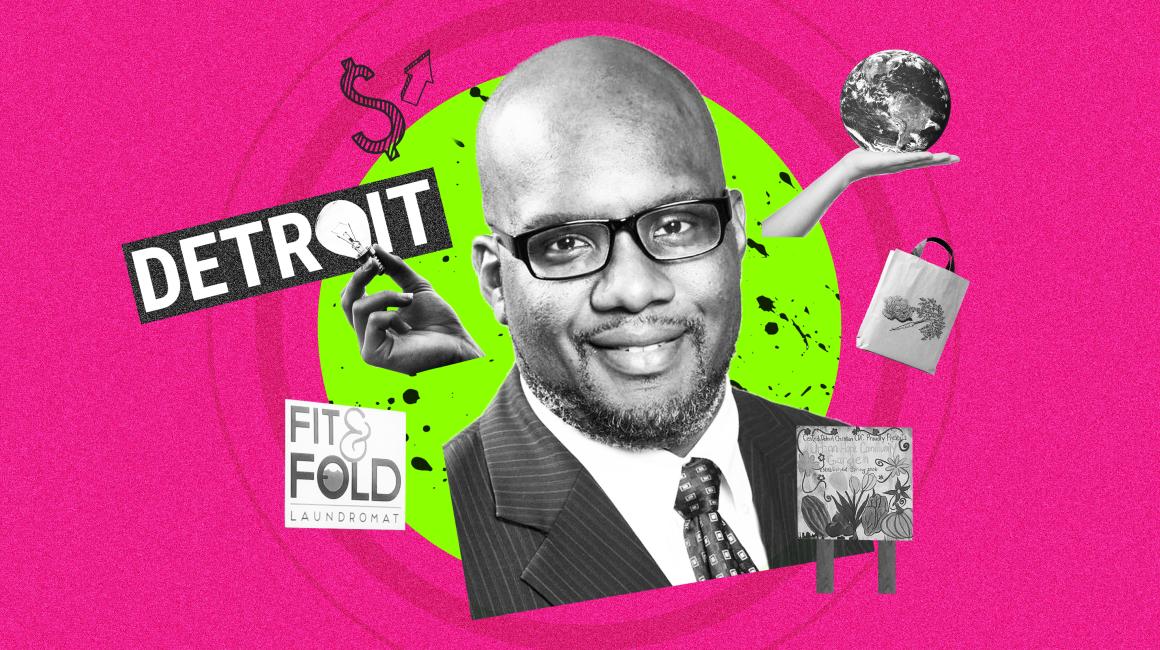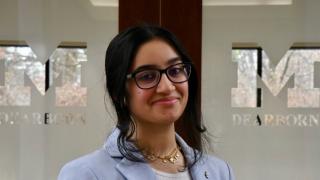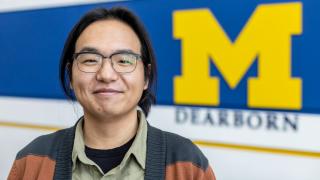
Marcus Harris is a Detroiter. Since his childhood, he’s seen neighbors in need. He’s known people who lacked the training needed to land a job. He grew up around innovative side hustles that helped people put food on the table.
“I’m a Detroit Public Schools kid who grew up on Detroit’s lower east side. My grandma, God rest her soul, ran our local Junior Achievement Center and got me thinking about best business practices as a teen,” he says. “That interest led me to a doctorate in business administration.”
As an adult in the city, the College of Business faculty member has seen how all of these things — social need and hustle — can come together to create a successful business model that’s focused on community while still making a profit.
With life experience, entrepreneurial drive and an advanced degree in business, Harris created and teaches the College of Business’ Social Entrepreneurship, Community Leadership, and Social Impact course (ENT 403). The course is offered virtually in Winter 2021; registration is open.
“It’s all about learning how to change your community by solving social problems,” he says. “Successful people have the ability to identify problems and develop innovative solutions. These skills will help you if you choose to pursue your own business venture. But problem solving is also an important skill to have in any field.”
To make sure the class gains the understanding of social entrepreneurship, writing business plans, finding funding opportunities and more, Harris connects students with local businesses. That way, they can learn from the individual entrepreneurs' experiences and see how they are improving their communities while earning a living.
Among the businesses the course partners with:
- Peaches & Greens, a produce store that creates fruit baskets and other gift items along with providing inner-city Detroit residents a low-cost place to get fresh fruits and veggies; they also have an ice cream truck-styled produce vehicle that brings healthy food options into the neighborhoods.
- Fit and Fold, a Detroit laundromat with exercise equipment inside so people can be active while they wait for clothes to wash and dry. They also do additional community programs like job training for people with no or limited job experience, and have offered free tutoring services for children while parents clean items.
- Oliver’s Biscuits, a local dog treat company that uses nutritious local brewery byproducts like used hops — which would otherwise be thrown away — and gives a portion of their profits to local humane societies. They also employ sex trafficking survivors to give a safe and steady employment environment.
Harris also brings in guest speakers like Michelle Smart, who founded Detroit’s Bags to Butterflies. Her business model employs previously incarcerated women as handbag and jewelry designers — which are then sold at her shop — to give the women transitional employment, confidence and a support system. And they create the items by using repurposed items from Detroit’s demolished homes.
“Social entrepreneurs think about the triple bottom line — planet, people, profit," Harris says. "They build social impact into their business plan. More and more people are seeing the value of this and I want our students to know how important business ventures like these are to the community and how they can be done successfully. It’s a partnership of purpose and profit.”
Urban and Regional Studies major Erie V. Nash says she previously took the course because of her personal interest in entrepreneurship. “This class gave me a hands-on approach to the resources involved in creating a self-reliable career for myself.”
Nash, who partnered with Fit and Fold for the course, says, “Learning how to create a business plan for a real social venture was a memorable experience for me. I am currently interning with the nonprofit Eastside Community Network. Because of Dr. Harris and the ENT-403 course, my understanding of community development and social impact could not be any clearer about social outcomes through social entrepreneurship.”

Senior Ali Bazzi, who is pursuing an Entrepreneurship Certificate, says Harris’ teaching style and experience — along with Harris’ Detroit business connections — makes this course a must-take for students.
“Dr. Harris kept us involved. He asked questions to make sure we felt like we were part of the lesson and encouraged us to be ourselves and speak our minds,” Bazzi says. “He wanted us to learn and truly understand how businesses can put their profits towards building a better future for the people in our society.”
And Harris says that’s what it’s all about: Creating a better future for all involved.
“Entrepreneurs know how to solve consumer problems. Now we are using that thinking for social good too,” he says. “It’s changing the world for the better— and still being able to make money while doing it.”
ENT 403: Social Entrepreneurship, Community Leadership, and Social Impact is a College of Business course offered during the Winter 2021 semester. For questions regarding the course, contact Harris.


